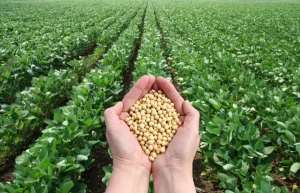Mango cultivation is an art that demands careful attention to various factors, and one of the crucial aspects is fertilizer management. The right balance of nutrients can significantly enhance mango yields, resulting in healthier trees and more abundant fruit production.
In this guide, we delve into the world of mango fertilizers, exploring the essential nutrients, application methods, and frequently asked questions to help you achieve optimal results in your mango orchard.

Understanding Mango Nutrient Requirements
Mango trees, like other plants, require specific nutrients for healthy growth and fruit production. The major nutrients required by mango trees are nitrogen (N), phosphorus (P), potassium (K), magnesium (Mg), and zinc (Zn), iron (Fe), manganese (Mn), copper (Cu).
Each nutrient plays a different role in a plant’s physiology, and a deficiency in any of them can hinder both growth and yield.
Major Nutrients Requirement in Mango Yields
| Major Nutrients | Description |
|---|---|
| Nitrogen (N) | Nitrogen is crucial for vegetative growth, leaf development, and overall tree vigor. Insufficient nitrogen can result in stunted growth, pale leaves, and reduced flowering. |
| Phosphorus (P) | Phosphorus is essential for root development, flowering, and fruiting. A lack of phosphorus may lead to poor fruit set and delayed maturity. |
| Potassium (K) | Potassium contributes to fruit development, quality, and disease resistance. Inadequate potassium levels can result in small, malformed fruits and increased susceptibility to pests and diseases. |
Read Also: Bamboo Farming
Micro Nutrients Requirement in Mango Yields
Micronutrients, though required in smaller quantities, are equally vital for mango trees. Zinc, iron, manganese, and copper are essential for various metabolic processes, and deficiencies can manifest as leaf discoloration, reduced growth, and fruit deformities.
Choosing the Right Mango Fertilizer
Selecting the right fertilizer is crucial to meet the specific needs of mango trees. A balanced fertilizer with a ratio of N:P:K is often recommended, such as 6:6:6 or 8:3:9. Additionally, fertilizers enriched with micronutrients are beneficial for overall tree health.
Organic vs. Inorganic Fertilizers
The main difference between organic and inorganic (chemical) fertilizers. Organic fertilizers, such as compost and manure, contribute to soil health and microbial activity. Inorganic fertilizers, on the other hand, provide a quick and targeted nutrient supply.
A combination of both can offer the benefits of both worlds, promoting sustainable and efficient mango cultivation.
Major Application Methods to increase Mango Yield
Proper application of fertilizers is as important as selecting the right type. Here are common methods used in mango orchards:
| Application Methods | Description |
|---|---|
| Broadcast Application | This method involves spreading the fertilizer evenly over the soil surface. It’s a practical approach for large orchards but requires accurate calculations to prevent over-fertilization. |
| Banding | Fertilizer is applied in bands around the tree’s drip line, focusing on the root zone. This method ensures that nutrients are concentrated where they are most needed. |
| Foliar Feeding | Spraying a nutrient solution directly on the leaves is known as foliar feeding. This method allows for quick absorption, addressing nutrient deficiencies promptly. |

Frequently Asked Questions (FAQs)
The frequency of fertilization depends on factors such as soil type, tree age, and local climate. Generally, you can apply a balanced fertilizer 2-3 times a year, with a major application before the growing season
While the nutrient requirements are similar, young mango trees may benefit from a higher phosphorus content to support root development. Adjusting the fertilizer ratio based on tree age can optimize growth.
Yes, over-fertilization can have adverse effects; consequently, it may lead to nutrient imbalances, root damage, and environmental pollution. It is crucial to follow recommended application rates and monitor the tree’s response.
Yellowing leaves, stunted growth, poor fruit set, and distorted fruit are common signs of nutrient deficiency. Consequently, soil testing can help identify specific nutrient deficiencies for targeted correction.
While organic fertilizers contribute to soil health, they may not provide a quick and concentrated nutrient supply. For optimal results, experts often recommend a balanced approach that combines organic and inorganic fertilizers.
Compost is an excellent soil conditioner, but its nutrient content may not be sufficient for mango trees’ high demands. Using a balanced fertilizer ensures the adequate supply of all essential nutrients.
Conclusion
Successful mango cultivation requires a holistic approach, with fertilization playing a pivotal role in achieving maximum yields. Understanding the nutrient requirements, choosing the right fertilizer, and employing appropriate application methods are key to fostering healthy and productive mango trees.
Moreover, by addressing common concerns through the provided FAQs, growers can navigate the intricacies of mango fertilization with confidence, ensuring a bountiful harvest and thriving orchards

Meet Our Expert Agricultural Administrator
Welcome to agrigreenhands.com, your dedicated hub for all things related to agricultural farming. Leading the way in our commitment to sustainable and innovative practices is Jawad Hussain, our esteemed administrator with a profound background in agriculture….







